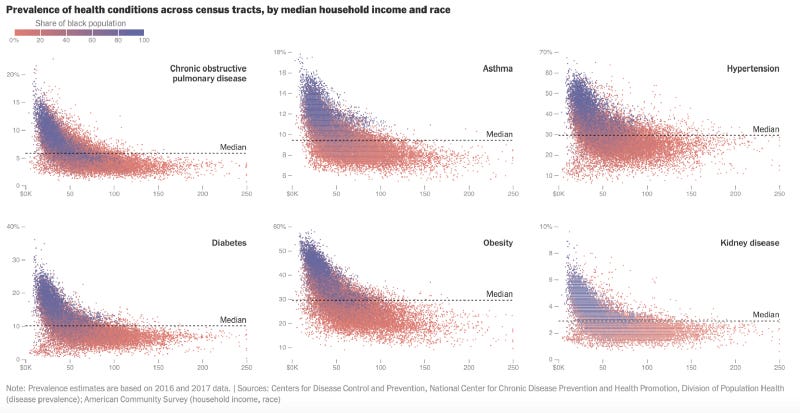Welcome to the Weekend Reccs by Harrison Satcher. This newsletter delivers a lovingly-tailored collection of thought-provoking goodness for your Sunday. Inside you’ll find: (1) a weekly column on economics, politics, or something unexpected, (2) a curated list of links for your enjoyment, (3) a lagniappe (because everyone deserves lagniappe), and (4) a collection of interesting, relevant charts. Grab a coffee and enjoy your morning.
New here? Be sure to subscribe to join the community and never miss an issue. If you enjoy what you read, please forward it to your friends.
The links marked with asterisks (*) are the recommended reads.
Hi friends,
On account of the holidays I’ll be foregoing this week’s The Long Read column. It’ll be back next week. For those that may have missed them, here is the whole Vaccinating Against Bad Economics series (so far?): (1) the real numbers of unemployment, (2) the boy-who-cried-inflation, and (3) a better way of today’s most important economic issue.
This week we look back at my 25 favorite Reccs from 2020. They’re given in chronological order.
Reccs of the Year, 2020 Edition
April 11: From our very first issue ever, a write-up of Vishan Nigam's important work with Michael Greenstone on the societal value of social distancing. ($)* Fun fact: Vishan was the first new subscriber to the Weekend Reccs when we moved to Substack in July!
April 11: A funny thread* about the design proposal for Pepsi’s 2009 rebranding.
April 25: An old, heart-wrenching webcomic* on different ways of looking at the little time you have left here on Earth. (s/o Keiran Carpen)
April 25: This article on grangerization*, a 1700’s version of fan fiction scrapbooking, was the first Recc to spur a torrent of reader emails.
May 30: “A Feud in Wolf-Kink Erotica Raises a Deep Legal Question” ($)*
May 30: When it comes to beauty, Alabama is the most underrated state. ($)*
June 6: Observations on America from a young man that would later become Prime Minister of Turkey.*
June 20: “Some People Are Too Superstitious To Have A Baby On Friday The 13th”*
July 11: A fascinating article* on the dirt used in horse racing, and the testing that goes in to it. As I noted in the issue that featured this article, the best part is the track superintendent’s superstitious nature, which seems in direct conflict with his rigorous testing regime.
July 25: It is incredibly difficult to define where one thing ends and the next begins.*
August 9: We renamed a bunch of genes because Excel kept thinking they were dates.*
August 15: An AI that brought tears to my eyes.*
August 22: When Citibank’s mistyped on Venmo and accidentally sent $900B.* (s/o Connor Murphy)
August 29: This was technically a lagniappe, but what the hell, it is my newsletter so I am including it. This paper on letters expressing gratitude* suggests you’ll feel better writing a few and the recipient will enjoy it more than you probably think. Maybe a good New Year’s Day activity?
October 10: You don’t know it yet, but you really want to spend 25 minutes watching endearing sheer joy this man has in completing an absurd sudoku.*
October 17: An insane animation* on how some medieval bridges were built. (s/o Benedict Brady)
October 24: An exquisite deck* on how the New York Times turned a rotten balance sheet into a digital age juggernaut.
November 8: “The erasure of Mesut Özil” ($)*
November 21: The Italian police use a Ferrari to race a donor kidney across the country.*
November 29: In-depth coverage on the Latino outreach arm of the Koch Network, Libre. ($)*
December 5: “You are floating…100 miles above the surface of Earth. You peer through your window and this is what you see.* You are people watching.”
December 12: How really, really, really slow computer programs* can teach us about the limits of mathematics, and perhaps answer its toughest questions.
December 20: Perhaps the best short film I saw this year: Ten Meter Tower.*
December 20: A very entertaining generator of fake dictionary entries.*
What was your favorite Recc this year?
Lagniappe
As this space so often serves as a place for advice, suggestions, and new things to try, I thought it would only be appropriate to continue the “best” theme with the five books I’ve most enjoyed this year (Not including Upending American Politics, which otherwise of course would be on the list five times).
Meditations by Marcus Aurelius (s/o Wes De Silvestro)
The Prophet by Kalil Gibran (s/o Winona Guo)
Where Good Ideas Come From by Steven Johnson (s/o Sendhil Mullainathan)
The Devil in the White City by Erik Larson (s/o Kaylyn Tuggle)
The Time Regulation Institute by Ahmet Hamdi Tanpınar (s/o Atakan Baltacı)
Graph(s) of the Year
[NYT] From June 6. This graph gives a lot in a small amount of space. We can see health outcomes tied to race, health outcomes tied to income, income tied to race, and the racial segregation of census tracts (by the lack of middling colors).
[WSJ] From August 22. Baumol’s cost disease plagues child care. Anyone who has taken Econ 101 can tell you why this is a problem — economies grow through specialization. If parents wish to be working we would prefer to have them in the workforce. It is bad for economic growth (and their happiness) if they want to be working but are instead running a bunch of at-home childcare industries for strictly their children because they can’t afford child care.
[The Economist] From October 3. Averages obscure heterogeneity, averages obscure heterogeneity, averages obscure heterogeneity, averages obscure heterogeneity, averages obscure heterogeneity, averages obscure heterogeneity. Here we see that the unemployed are over-represented at both extremes. We might not have been able to discern these unhealthy behaviors if we just looked at just average hours of sleep per night. To speculate, a likely cause for these sleep patterns is that having a job is a regularizing force that gives you some schedule by which to plan your day/night/sleep, and enforces said schedule.
[Opportunity Insights via Brookings] From October 24. This is what people mean when they refer to a K-shaped recovery.
[u/look@num] From November 21. I just really enjoy this graph’s ability to convey a few related data points clearly.
Happy New Year!
Harrison








